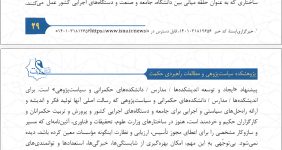هوشنگ شیخی | تحلیل توافق اخیر امارات و بحرین با رژیم صهیونیستی
TEHRAN – While the White House portrays the normalization deals between some Arab states and Israel as “the dawn of a new Middle East [West Asia]”, an expert on West Asia tells the Tehran Times that the normalization deals are doomed to fail.
On Tuesday afternoon, U.S. President Donald Trump hosted high-ranking American and foreign officials including Israeli Prime Minister Benjamin Netanyahu, and Abdullah bin Zayed and Abdullatif al-Zayani, the foreign ministers of Bahrain and the United Arab Emirates, who traveled to Washington to sign the U.S.-brokered normalization deals, officially known as the Abraham Accords.
The deals were signed with great fanfare after Abu Dhabi and Manama took the controversial step of fully normalizing relations with Israel without solving the decades-long Israeli-Palestinian conflict, which has been only exacerbated in recent months as Netanyahu announced his plan to annex large swaths of the West Bank. The UAE has said that Israel has agreed to halt the annexation plan and the Emirati foreign minister has thanked Netanyahu for “halting the annexation of Palestinian territories,” during his speech at the signing ceremony of the normalization deals at the White House. However, the Israeli prime minister has boasted on many occasions that he only agreed to “suspend” not halt the annexation plan.
Abdullah bin Zayed said the normalization deal with Israel will enable the UAE to support the Palestinian people. “And as for us in the United Arab Emirates, this accord will enable us to continue to stand by the Palestinian people and realize their hopes for an independent state within a stable and prosperous region,” the foreign minister said.
It’s not clear how the UAE’s deal with Israel would help establish an independent state for the Palestinian people while it virtually marginalizing the Palestinians in the normalization negotiations with Israel. The Palestinians have strongly condemned the normalization deals between Bahrain and the UAE and Israel as a stab in the back, further undermining the “peace” between Arab states and Israel.
Analysts and commentators believe that the peace deals may not last long given the strong opposition to them across the region and the lack of historical bonds between Israel and the Arab world. However, Trump seems to be upbeat about what he calls changing “the course of history”.
“We’re here this afternoon to change the course of history. After decades of division and conflict, we mark the dawn of a new Middle East. Thanks to the great courage of the leaders of these three countries, we take a major stride toward a future in which people of all faiths and backgrounds live together in peace and prosperity,” Trump said at the Tuesday ceremony.
Arab normalization deals with Israel were a type of histrionics meant to serve election goals and that they could be reversed in the not-so-distant future, according to Houshang Sheikhi, a political analyst and expert on West Asia.
“The people behind these deals were so tickled pink that they put on a histrionic display of exaggerating the importance of the normalization deals to achieve election goals. So I think these deals are likely to be reversed. Because deals are usually signed based on a set of interests. There are no great economic opportunities between Israel and Bahrain and the UAE. Considering the characteristics of the economies of Bahrain and the UAE and the economic capabilities of Israel, the two sides cannot build a long-term relationship. Because economic partnership is one of the things that can strengthen the relationship,” Sheikhi told the Tehran Times. “Neither Israel is a big market for Bahrain and the UAE, nor do Bahrain and the UAE enjoy manufacturing-based economies that can gain a share of the Israeli market.”
According to the expert, Bahrain and the UAE already had security contacts with Israel and Israeli operatives and agents have been active in Dubai and Abu Dhabi to oversee operations.
“It’s unlikely that the relationship between the UAE and Bahrain and Israel would constitute normal and win-win ties in the long run or even in the short term. Because they have nothing to share. Therefore, the normalization deals have a very little chance to last long,” Sheikhi pointed out.
Aside from the economic aspects, some analysts point to the recent history of ties with Israel in the Arab world, which failed to break Israel’s isolation in the region. Prior to Bahrain and the UAE’s moves, at least two Arab countries had normalized ties with Israel in the past, but both ended their ties with Israel at later times. These two countries – Qatar and Mauritania – had no borders with Israel. The first country was Qatar, which established ties with Israel in the 1990s.
The story of Qatar’s relations with Israel dates back to 1995 when Sheikh Hamad bin Khalifa Al Thani was in need of foreign support after he staged a coup against his father. As a result, Qatar opened an Israeli trade office on its territory in a controversial move that year. The Emir of Qatar gradually consolidated his power, and as the policy of supporting the Palestinian cause became more prominent in Qatar’s foreign policy, the tiny country finally closed the Israeli trade office in 2000, and relations between the two sides officially ended; although this relationship went on informally to this day.
Israel’s relationship with Mauritania was both broader and more instructive. About four years after the establishment of trade relations between Qatar and Israel, in 1999, Mauritania also established formal diplomatic relations with Israel. The two sides established embassies and exchanged ambassadors. Security and military cooperation was also established between the two sides. But in 2009, due to the Israeli war on Gaza, Mauritania severed ties with Israel and expelled the Israeli ambassador, and even razed the Israeli embassy in Nouakchott to the ground.
Whether a future war with Gaza would damage the relationship between Israel and the UAE and Bahrain, remains on open questions. But it seems that the Israelis are worried about a possible reversal of ties between them and the Arab countries.
This may be the reason why an Emirati official recently sought to dispel speculations that an Israeli war with Gaza could spell the end of the UAE-Israel diplomatic ties. The official, Ali al-Nueimi, the head of the UAE Defense and Foreign Relations Committee, said the UAE-Israel relations will not be affected if a war takes place in the densely-populated Gaza Strip.






